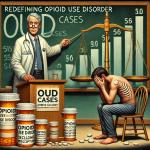Purdue Pharma recently reached a $7.4 billion settlement with all 50 states and the Di
opioid crisis
I've written about nonsense like this before, yet it still lives to plague us.
Overdose deaths from opioids are down over the last year, opioid prescriptions have plummeted by 44% in the last decade, National settlements have been reached with Janssen, Cardinal, McKesson, AmerisourceBergen, Teva, Allergan, CVS, Walgreens, Wa
Let's give the DEA and FDA a (Bronx) cheer (1). They continue to amaze. What they may lack in common sense they make up through diversity. As in "They can sure screw up a diverse set of problems."
It is hard to explain one’s pain and equally challenging to describe in academic literature. Unfortunately, the numbers used to quantify both are given an unearned certainty.
For anyone with the intellectual capacity of a turnip, it should be more than obvious that the "iron law of prohibition," something Dr.
This one is for Thom, our President and a very avid coffee drinker. The dirty dozen fruits and vegetables were not enough; now, the Environmental Work Group is coming after decaffeinated coffee.
More than 90 Chinese companies openly sell fentanyl precursor to any willing buyer. Since 2018, cryptocurrency has been used to pay between $27 and $37 million for these materials.
Let’s begin by looking at the findings of the “study.” I am putting study in quotes because this is just another example, albeit an especially bad one, of mining a database created and maintained by others for academic purposes.
I have to give Lynn Webster credit.












